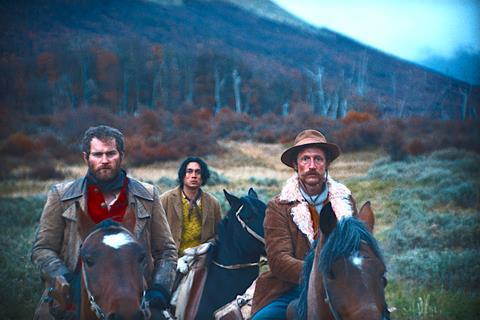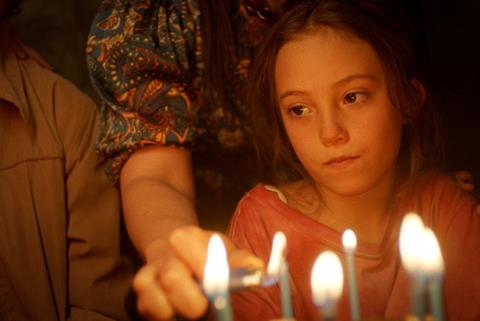The directors of The Settlers and Totem — Chile and Mexico’s entries to the best international feature Oscar — discuss originality, genre, their countries’ film industries and the challenges of filming with children and on far-flung locations.

The Settlers and Totem are both strong Latin American contenders in the best international feature Oscar category, but thematically they could not be more different. The Settlers, from Chilean filmmaker Felipe Galvez, explores a little-known episode in his country’s history, while Totem, from Mexico’s Lila Aviles, is centred around an intimate family tragedy.
Totem — inspired by an untimely death that affected Aviles’s own family, and her second feature following much-lauded 2018 debut The Chambermaid — premiered at the Berlinale, where it won the Prize of the Ecumenical Jury before travelling on to festivals including Beijing, Marrakech and San Francisco.
Told from the point of view of seven-year-old Sol (Naima Senties), who comes to realise the birthday party planned for her unwell father may well be his last, Totem is a production of Mexico’s Limerencia and Laterna, in co-production with Denmark’s Paloma Productions and France’s Alpha Violet. Sideshow and Janus Films have North American rights, and New Wave released in the UK.
The Settlers has sold to Mubi for North America, the UK, Latin America and a number of other territories. Galvez’s debut feature transports viewers to Chile’s Tierra del Fuego (aka ‘the end of the world’) at the dawn of the 20th century, and follows a wealthy landowner (Alfredo Castro) who hires an English lieutenant (Mark Stanley) and a US mercenary (Benjamin Westfall) to open a route to the Atlantic for his flock of sheep. Their guide is a Chilean mestizo, who becomes an unwitting accomplice to a sinister massacre of the Selk’nam native people.

A co-production between Chile, Argentina, Taiwan, France, Denmark, Sweden, Germany and the UK’s Quiddity Films, with Emily Morgan among the producers, The Settlers premiered in Cannes’ Un Certain Regard, where it won the Fipresci prize. Screen International brought the two filmmakers together for a Zoom conversation in November.
Screen International Felipe has made something of a western, while Totem is closer to family drama. How have you tried to put your own spin on these familiar genres?
Lila Aviles: I have not tried to pursue originality. There are even other films with the same title. How many films talk about loss? The root of the film comes from my own motherhood and the mourning of my daughter, who lost her dad. That’s the beauty of art: it doesn’t matter if stories are repeated, but rather the connection that is made with your spirit.
Felipe Galvez: I wanted to make a film about the Selk’nam’s genocide, and I thought it had to be through a western. Similar to what Lila says, there are thousands of westerns. It’s hard to make one that’s original. I don’t do thorough character studies, I don’t even believe in building heroes. So I protect myself by infiltrating into a genre and bending its rules to keep the viewer’s attention. In a way, as an infiltrator, what I do is to question [the western] genre — which was also a kind of propaganda of colonisation. The viewer follows the codes of the western, especially in the most challenging sequences, where it is very difficult to maintain a connection with the characters. But I don’t offer a final vision. Rather, I let the viewer decide how they feel about it.
Lila, the role of Sol, the girl, is key to Totem. How was it to work with your young actress?
Aviles: Gabriela Cartol [the lead actress in The Chambermaid] and I did the casting, and we found this wonderful girl Naima. She was an absolutely normal child. There was something about her view of life that was very special. She and I talked a lot before the first casting, and I liked her ability to talk about many topics. She was a very sensitive child and had never acted in her life. It was nice how that basis of friendship was built between us.
Felipe, you didn’t deal with the challenges of kids, but with Tierra del Fuego. How was the shooting?
Galvez: Much of what I know about cinema I learned during the process of making The Settlers. When I wrote the film I thought that one of the coolest ideas was to make a movie only outdoors and on horseback, because it was going to be much cheaper and simpler. Later I found out that I was in big trouble. And at the end of the world, too. I was also fortunate to have a director of photography [Simone D’Arcangelo] who had already worked in Tierra del Fuego. I learned never to go against nature, so I did not cling to the script and I filmed what could be filmed. If there was a lot of rain and 80km per hour winds, you couldn’t shoot on horseback or in the sea. One night, a storm came and literally took the whole set. I let myself be carried away by nature, something consistent with the film’s approach because, in it, the landscape is one more character that plays a narrative role.
Beyond the increased visibility, what does the Oscars competition mean to you and your careers?
Aviles: I already experienced it with The Chambermaid and, regardless of what happens, it is a beauty. I am experiencing it with more maturity and enjoying the journey, in which I have become a nomad because you do not stop travelling. During the whole promotion you meet the audience again, and this is wonderful. And representing my country fills me with gratitude.
Galvez: It’s been a little crazy and weird. It took me about nine years to make this film and it felt like I did not sleep for years thinking I would never get to do it. When we managed to make it and release the film, the joy was tremendous. Even though I’m not a father, I feel my film is my child and it’s growing up too fast. Being chosen for the Oscars race is something I take as a responsibility and a privilege.

How would you describe the current film industry landscape in your respective countries?
Aviles: There are two public funds, and that is exhilarating. The problem is that sometimes the jury varies and you depend on that jury to get selected. Sometimes the jury is very attuned to contemporary cinema, but it may also be the first time that they invite their members to assume this responsibility and the opposite happens. Sometimes these funds go to very commercial films and, at other times, they bet on more artistic approaches. What I do believe is that there is now enormous creative freedom, despite the prejudice that a Mexican film must contain a high dose of violence.
Galvez: Unlike Mexico, Chile has no money for film or culture in general. Chile needs to co-produce, it can hardly make a film on its own. It’s a perverse mechanism that forces you to compete fiercely. The public fund is just for five films per year. You cannot fail in your first film if you want to do another one. So you work with this enormous pressure. The curious thing is that this system is giving such good results and great diversity. Now there are some seven or eight directors who have great international prestige and make animation, adventure, autobiographical films and mega-productions. I never won the Audiovisual Fund in my country. My project ended up on a waiting list and I spent six years applying.
What do you hope from your careers moving forward?
Aviles: My dream would be to have a career like Agnes Varda’s. I mean I would love to become a crazy and spirited old lady who makes all kinds of films — from the very big to really small-budget ones. And I would love to do that in all parts of the world — the US, Colombia, Taipei. I always travel with my camera and sometimes I fall in love with something, somebody in a corner. And then I would like to begin a documentary, for instance. And suddenly, one day to be involved in another very big [film]. I would like not to lose that momentum.
Galvez: In The Settlers, I was interested in infiltrating the western — I want to continue exploring that path in other genres. I always say The Settlers is about a page erased from the history of my country, and I feel there are other pages that, rather than being erased, were stolen. I’m interested in the idea of studying them, and analysing other types of propaganda. The idea is not to stop. The only thing I dream about is not to take nine years to make another one because I have spent many nights awake already!

























No comments yet